Best All-Season Tires for 2024
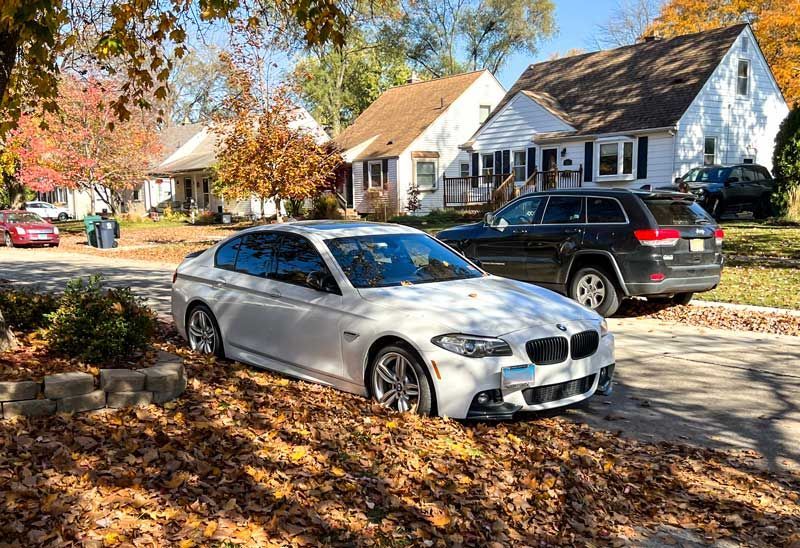
Some of the links on this page may link to our affiliates. Learn more about our affiliate policies.
Last Updated: December 28, 2023
Getting your vehicle on the road should be safer and more exciting, no matter what time of the year. But to ensure a safe and thrilling ride, you need a reliable set of all-season tires. Made from intermediate rubber compound, all-season tires give your car optimal traction in all conditions, except when you have to switch to winter tires during adverse snowy conditions.
The tread pattern of the all-season tires is suitable for a range of temperatures and road conditions. These versatile tires are designed to help you get away with just a single set of tires without worrying about where to store the spares. As all-season tires offer a blend of winter and tires, they are ideal for getting your car on the road in moderate driving and climate conditions.
All-season tires are the most popular option for everyday drivers, but how do you know which model fits your vehicle best? Buying a reliable set of all-season tires can be daunting, but worry no more. This write-up will review some of the best all-season tires available.
Best All-Season Tires
Michelin CrossClimate2 - Best Overall All-Season Tire
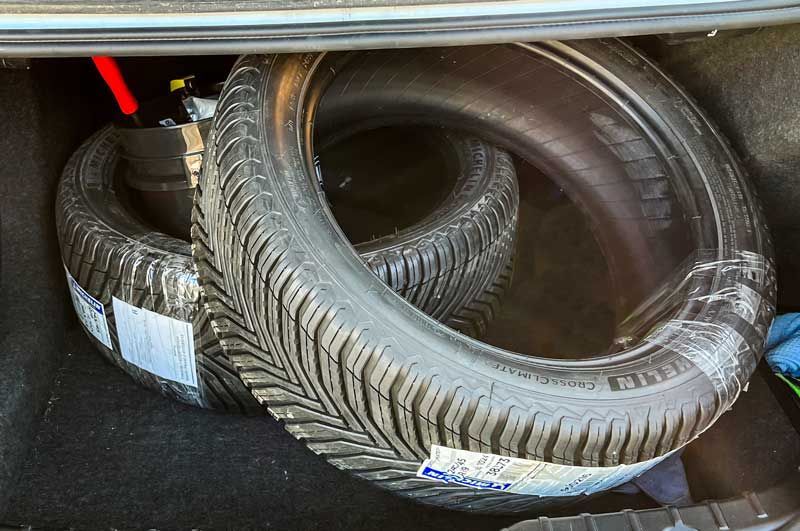
The Michelin CrossClimate2 is a tire model produced by Michelin, a renowned French tire manufacturing company. Introduced as the successor to the original CrossClimate tire, the CrossClimate2 is designed to be an all-season tire that provides excellent performance in various weather conditions, including dry, wet, and snowy conditions. They are by far my favorite choice for an All-Season tire, as you can probably tell from my Michelin CrossClimate2 review.
Key features of the Michelin CrossClimate2 tire include:
- V-Formation Tread Design: The CrossClimate2 tires have a unique V-formation tread pattern, offering better traction and grip on wet and dry surfaces. This design helps evacuate water and slush efficiently, reducing the risk of hydroplaning and providing excellent performance in various weather conditions.
- 3D Self-locking Sipes: The tire incorporates 3D self-locking sipes that enhance the tread block stability and reduce treadwear. These sipes provide biting edges for traction on snow and ice, making the tire more versatile in winter conditions.
- Compound Technology: Michelin uses a silica-based compound to construct the CrossClimate2 tire. This compound balances wear resistance, fuel efficiency, and traction across various temperatures.
- Reinforced Sidewalls: The CrossClimate2 features reinforced sidewalls to improve overall durability and resist punctures or cuts, ensuring a longer-lasting tire.
- All-season Performance: The tire is designed to perform excellently in all seasons and weather conditions, including dry, wet, and snowy roads. It has received the 3-Peak Mountain Snowflake (3PMSF) symbol, which signifies that it meets the required performance criteria for use in severe snow conditions.
- Longevity and warranty: Michelin claims that the CrossClimate2 tires offer up to 15,000 miles more wear life compared to its main competitors. The tire also has a limited treadwear warranty, which varies depending on the tire size and speed rating.
Overall, the Michelin CrossClimate2 tire is a versatile and durable option for drivers seeking an all-season tire with excellent performance in various weather conditions. It has received positive reviews for its traction and handling capabilities and its long-lasting tread life.
Pros
- All-season tire with exceptional lateral grip in dry conditions
- Impressive handling and take-offs even when lots of snow on the ground
- Dry roads have very short stopping distances
- Wet roads require excellent lateral grip and braking
- It is easy to drive in wet conditions
- Direct and responsive steering
- Excellent handling and braking in snow and slush
- A firm but composed ride
- Even on the roughest parts of the road, there is not a lot of tread noise
Cons
- Some buyers may find it too expensive
- It has a lower treadwear warranty than the closest competitors
- It's not extremely great in turns when there is heavier snow on the ground, even with a AWD car
Continental ExtremeContact DWS06 Plus
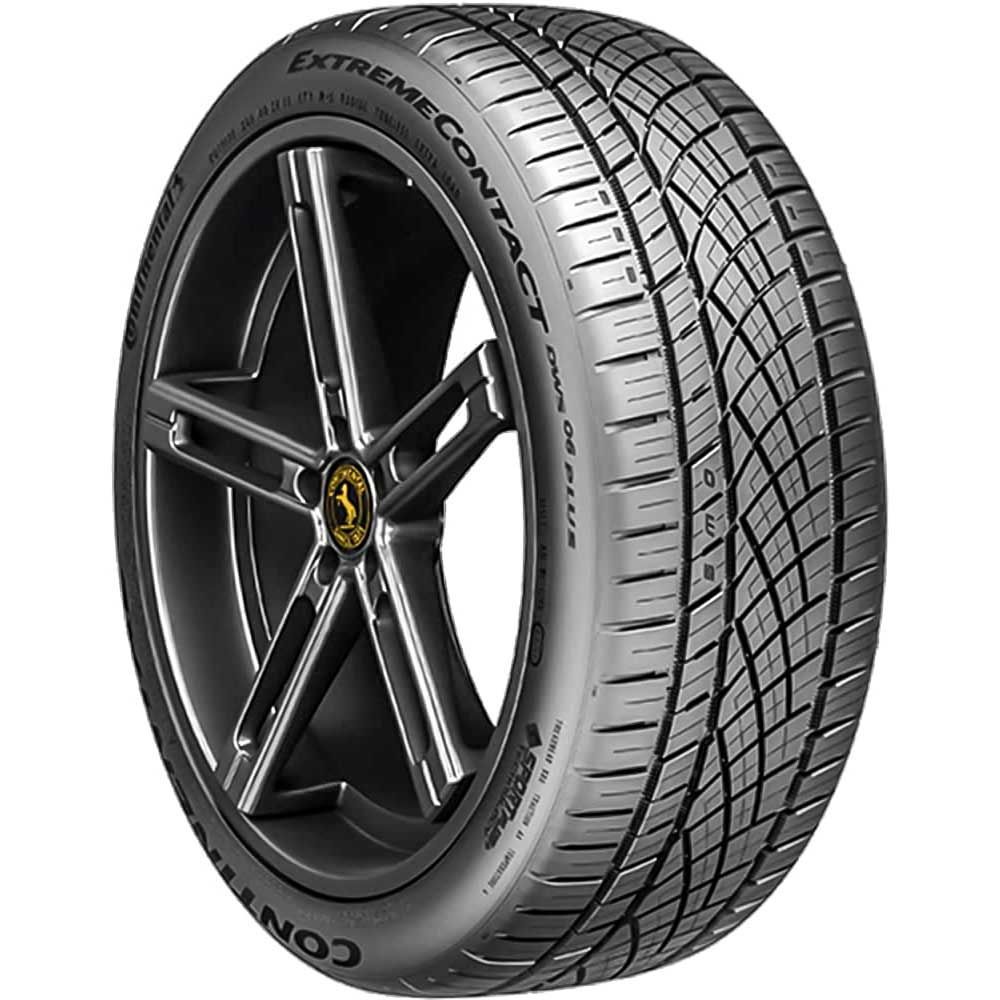
The Continental Extreme Contact DWS 06 Plus is second pick for the best all-season tires. It is one of the most accomplished ultra-high-performance all-season tires available. This versatile tire does wonders in almost every climate.
The rubber compound of the Continental Extreme Contact DWS 06 Plus aids in fuel efficiency and tread life while providing responsive handling and sure-footed traction in dry, wet, or light snow conditions. The enough dry grip and traction of the tire give you the thrill while pushing the vehicle to the limits.
The way Continental Extreme Contact DWS 06 Plus handles rainy conditions is quite impressive. The tire has greater traction on wet tarmac, providing excellent acceleration and the shortest barking distance. This tire is also easier to handle in winter, with good behavior and balanced handling at the limit.
On the downside, the Continental Extreme Contact DWS 06 Plus is slower to react than its counterparts of the same class, but this problem does not affect your driving experience.
Pros
- Excellent dry and wet performance
- Budget-friendly
- Long tread life
- Good traction on light snow
- Balanced handling and high lateral grip
- Exceptional performance in rainy conditions
Cons
- Less responsive steering
- Lacks deep snow traction
Overall, the Continental Extreme Contact DWS 06 Plus is an excellent choice to drive on wet and dry roads. The price of the tire is steep, but ide delivers superior durability.
Bridgestone Potenza RE980AS Plus
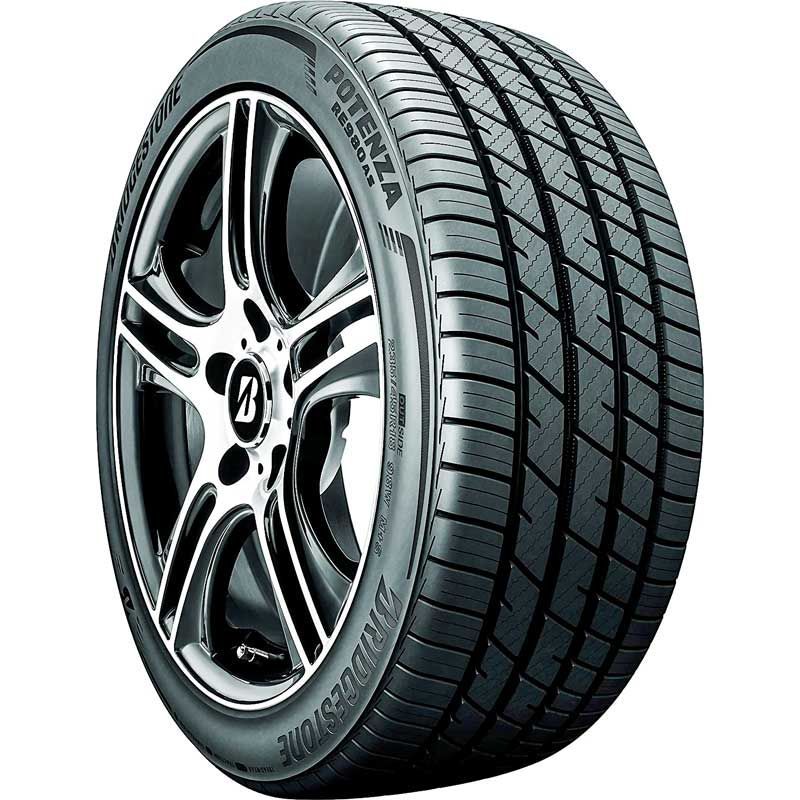
If you want to enjoy a safe and smooth ride, why not try Bridgestone's UHP all-season tire? This tire has sharp responses and an excellent on-center feel, with the sharpest steering in its class. In addition, Bridgestone Potenza RE980AS Plus is accompanied by excellent grip and traction on dry roads with good behavior at the limit.
Compared to the non-plus model, Bridgestone Potenza RE980AS Plus delivers excellent snow traction with an easy-to-drive nature and balanced handling. However, although the tire performs very well in rainy conditions, it generally offers less traction than premium UHP all-season tires.
Thanks to its noise-free operation, Bridgestone Potenza RE980AS Plus gives a comfortable and smooth ride. The tire also comes with a tread wear warranty of 50,000 miles.
Pros
- Noise-free operation
- Taut but pleasurable ride
- Easy to drive on light snow with balanced handling
- Exceptional light snow traction
- Balanced handling on wet and dry roads, even at the limit
- Excellent lateral grip and high levels of longitudinal traction
- Sharp-steering and super responsive
Cons
- Lower wet traction
- Not considered to be a great all-season tire for snow in deeper snowfall
Bridgestone Potenza RE980AS Plus is recommended to enjoy a smooth and safe ride in wet and dry conditions.
Goodyear Eagle Exhilarate
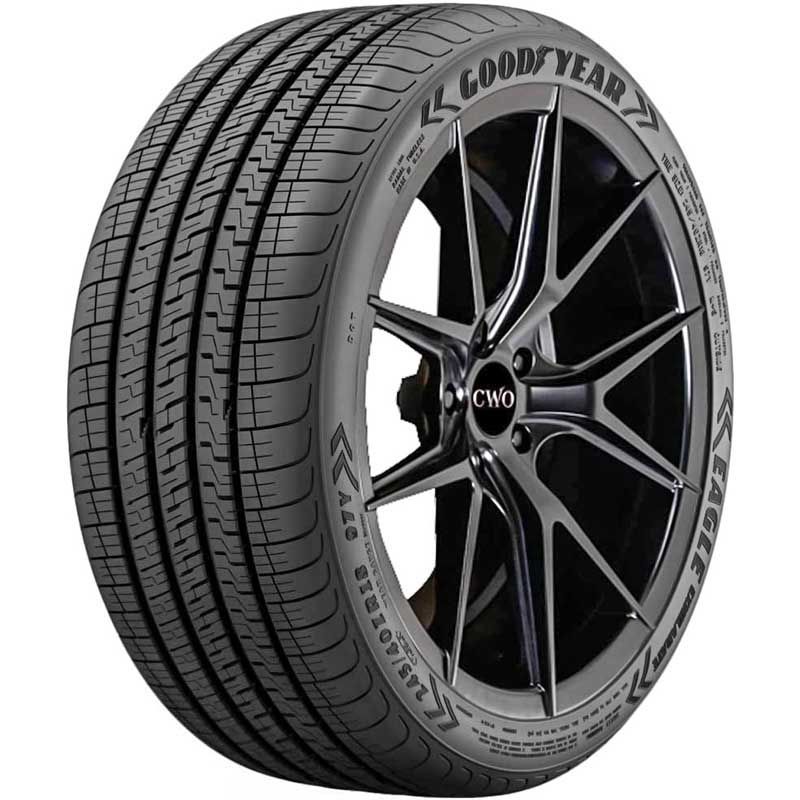
Goodyear's Eagle Exhilarate is another top pick for the best all-season tires. It is one of the best performers in the dry and wet conditions of the same category. In addition, due to its average snow traction, Goodyear's Eagle Exhilarate is suitable if you don't live in areas where it frequently snows in the winter.
The responsive steering of Goodyear's Eagle Exhilarate makes it one of the best all-season performance tires to drive. On top of that, the traction of the dry grip of the tire is almost on the same level as a summer performance tire. The handling of the tire is very balanced, even at the limit.
The wet traction of Goodyear's Eagle Exhilarate is also impressive, with sure-footed handling. In terms of a smooth and comfortable ride, Eagle Exhilarate could be smoother over pumps, but it is quiet enough on the highway. The tire also comes with a tread wear warranty of 45,000 miles, which is good for the price.
Pros
- Excellent tread wear and tread life warranty
- Less noisy for a performance tire
- Excellent lateral grip and good braking on dry roads
- Good behavior and balanced handling at the limit in the rainy conditions
- Exceptional ride comfort
- Excellent wet and dry traction
- Sharp and responsive steering
Cons
- Less comfortable ride-over pumps
- Lacks deep snow traction
Eagle Exhilarate can be an excellent steal for anyone looking to have a premium-quality all-season tire at affordable rates.
Kumho Ecsta PA51
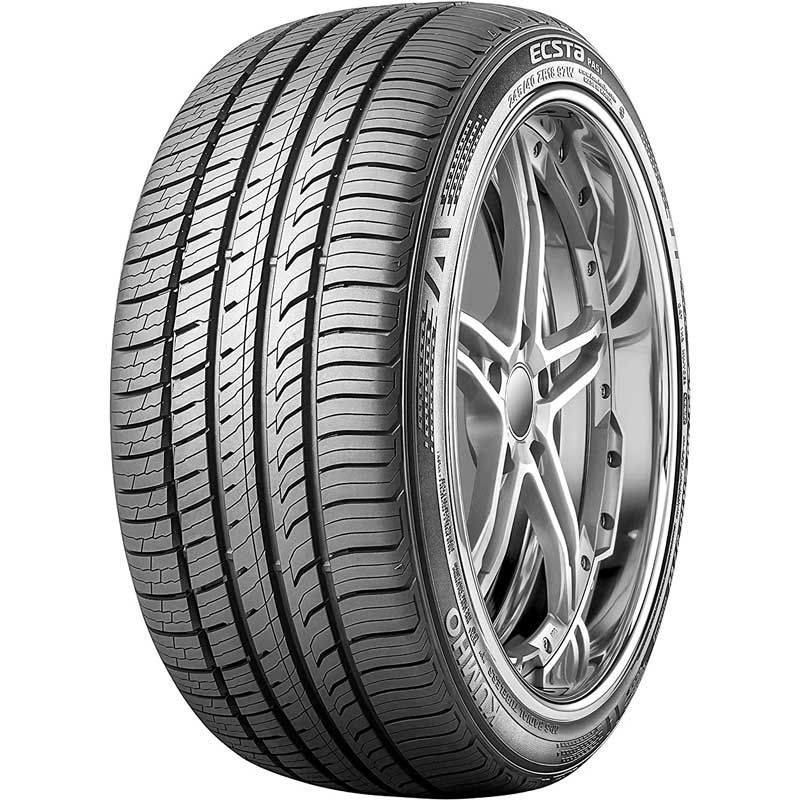
Drivers highly recommend Kumho's Ecsta PA51 because it provides a smooth ride over various surfaces. The tire also does not make any noise, even at higher speeds. The steering of Kumho's Ecsta PA51 is not as precise and responsive as some of its competitors, but it does not hurt your driving experience.
The Kumho's Ecsta PA51 grips the road well with balanced handling, irrespective of the climate and driving conditions. Kumho also offers a tread wear warranty of 45,000 miles with its versatile Ecsta PA51.
Pros
- Good tread wear and tread life warranty
- Less noisy even at higher speeds
- Smooth and comfortable ride over most the surfaces
- Balanced handling
- Exceptional lateral grip and longitudinal traction on wet tarmac
- Good handling and solid grip on dry pavements
Cons
- Less responsive steering
- Less light-snow traction
Overall, Kumho's Ecsta PA51 can be a significant investment if you live in an area that does not experience severe winter.
Yokohama Geolandar CV G058
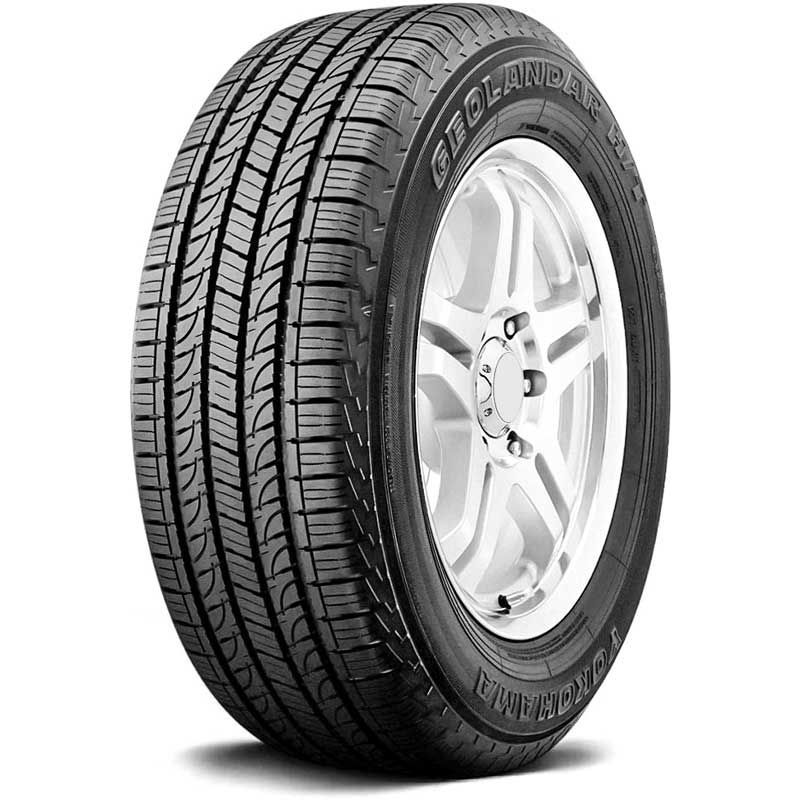
Yokohama Geolandar CV G058 is a great all-season tire designed for crossovers, minivans, and small SUVs. This tire delivers the best year-round performance with plenty of comfort. In addition, Yokohama Geolandar CV G058 performs well in all conditions, from dry to wet to light snow.
Yokohama offers a tread wear warranty of 65,000 miles to help you drive further before worrying about paying for a tire replacement. The manufacturer also uses Micro Silica compound to give its tire more durability.
Pros
- Outstanding tread wear warranty
- Excellent traction on dry and wet roads
- Improved stability for winter driving conditions
- Even weight distribution for better tread life
Cons
- A bit costlier
- May affect fuel economy
What are All-Season Tires: A Brief Overview
As the name suggests, all-season tires provide a smooth, quiet ride teamed with optimal traction level, irrespective of the season or whether the road is dry or wet. These are the most popular tire type so far because they are best suited to the needs of drivers.
All-season tires perform excellently in most situations and can be used all year round. However, these tires only fall short in severe driving and climate conditions, such as driving on a racetrack or deep snow.
All-season tires have numerous sipes and grooves for weather conditions such as hot pavement, rain, or snow. All-season tires tend to last longer and perform well compared to traditional tires. They usually come with a tread life warranty of more than 50,000 miles. Due to their high rolling resistance, all-season tires yield higher fuel economy than standard types.
Benefits of All-Season Tires
Having the right tires on your car can significantly impact your ride. All-season tires are worth considering if you want to keep your tires the same depending on the season. These tires are great for making your ride comfortable and safe. In addition, all-season tires will work seamlessly whether you're driving in rainy or snowy conditions.
Choosing all-season tires has significant advantages, such as:
- With all-season tires, you don't have to make the time to swap winter or summer tires out with the season.
- These tires have an impressive grip on wet and snow-covered conditions.
- All-season tires deliver good braking performance on dry and wet summer roads.
- The tires deliver best-in-class rolling resistance performance, significantly reducing fuel consumption without compromising safety.
- All-season tires are designed to deliver the best performance and excellent traction in hot and cold conditions, including light snow, slush, mud, and rain.
- The tires deliver outstanding aquaplaning performance with a sophisticated shoulder groove geometry to ensure safe driving throughout the year.
Things to Consider Before Purchasing All-Season Tires
- Driving Conditions and Climate: Consider your area's typical weather conditions and driving habits. All-season tires are designed to perform well in various conditions, including light snow, but there may be better choices for regions with heavy snowfall or extreme temperatures. Dedicated winter or summer tires may be a better option in such cases.
- Tread Life and Warranty: Tire longevity is essential for cost-effectiveness and safety. Look for tires with a longer tread life and a good warranty. Manufacturers often provide a treadwear warranty in miles, which can help you compare the expected life of different tire models.
- Tire Performance: Evaluate the performance characteristics of the tires in various conditions, such as wet and dry traction, handling, braking, and ride comfort. Read reviews and check tire ratings from reputable organizations like Consumer Reports, Tire Rack, or the Uniform Tire Quality Grading (UTQG) system.
- Tire Size and Load Capacity: Ensure that the tires you are considering are the correct size for your vehicle by checking the owner's manual or the information placard on the driver's side door jamb. Additionally, consider the load capacity of the tires, which should be suitable for your vehicle's weight and the loads you typically carry.
- Fuel Efficiency: Tire rolling resistance affects your vehicle's fuel consumption. Low-rolling resistance tires can improve fuel efficiency by reducing the energy required to move the tire. Check the manufacturer's specifications for the tire's rolling resistance and fuel efficiency performance.
- Price and Budget: Set a budget for your tire purchase, and remember that more expensive tires may offer better performance, longevity, and overall value. However, some mid-range or budget tires may still provide adequate performance for your needs. Consider the total cost of ownership, which includes the initial cost of the tires, installation fees, and potential fuel savings over the tire's life.
- Noise and Ride Comfort: Some all-season tires may produce more road noise or offer a stiffer ride compared to others. Consider your preferences for a quiet and comfortable ride when selecting a tire. Reading reviews and consulting with a tire professional can help you determine which tire models excel in these areas.
- Speed Rating: Tires come with a speed rating that indicates the maximum speed the tire can safely handle. Choose a tire with a speed rating suitable for your vehicle and driving habits. Common speed ratings include S, T, H, V, W, and Y, with Y being the highest.
- Availability and Installation: Check the availability of the tires you are considering, as some models or sizes may have limited availability or be specific to certain regions. Also, find a reliable and reputable tire installer who can provide professional installation and balancing services.
By considering these factors, you can make a well-informed decision when purchasing all-season tires, ensuring you select the best for your specific needs and driving conditions.
How Much Do All-Season Tires Cost?
The cost of all-season tires can vary greatly depending on factors such as brand, size, performance, and overall quality. Here is a breakdown of the price ranges you can expect when purchasing all-season tires:
- Budget Tires: $50 - $80 per tire. These are the most affordable options on the market, typically produced by lesser-known or entry-level brands. Budget tires may offer basic performance and shorter tread life but can be suitable for drivers with limited budgets and basic driving needs.
- Mid-range Tires: $80 - $150 per tire Mid-range all-season tires are produced by established and emerging brands. These tires offer a balance of performance, tread life, and ride comfort at a moderate price. They can cater to various drivers, from daily commuters to those who occasionally venture on long road trips.
- Premium Tires: $150 - $300+ per tire. Well-known and reputable brands like Michelin, Bridgestone, and Goodyear manufacture premium all-season tires. These tires offer their class's best performance, handling, ride comfort, and longevity. They often come with better warranties and are designed for drivers who prioritizing safety, performance, and overall quality.
Remember that these approximate price ranges can vary depending on the specific tire model and size. Additionally, the cost of tires may be influenced by regional factors, such as taxes and shipping fees.
When budgeting for all-season tires, it's important to consider the additional costs associated with tire installation, balancing, and alignment. Depending on the service provider and location, these services can range from $15 to $50 per tire.
Investing in high-quality all-season tires can lead to long-term savings, as they generally offer better performance, fuel efficiency, and tread life. While the initial cost may be higher, the total cost of ownership may be lower when considering the extended life and reduced need for frequent replacements.
The Car Data Tire Testing Methodology
We take pride in providing thorough and unbiased reviews of the latest tire models. To ensure that our ratings are accurate and consistent, we have developed a rating methodology that considers various factors and incorporates statistical analysis.
- Performance: We test tires for their performance in various driving conditions, including wet and dry roads, snow and ice, and off-road terrain. We also consider handling, braking, noise, and ride comfort factors. These tests are conducted using standardized procedures, and the results are analyzed using statistical methods to determine the mean and standard deviation.
- Durability: We assess the durability of tires based on factors such as tread life, resistance to punctures and cuts, and sidewall strength. These tests are conducted using standardized procedures or data gathered from third-party websites where real users share their experiences with the products we are reviewing. We then analyze the results using statistical methods to determine the mean and standard deviation.
- Value: We consider the price of the tire and compare it to its performance and durability to determine its overall value. We pay close attention to how long the tires last, the reported lifespan of the tires, as well as the ratio of those metrics when compared to the price.
- Customer reviews: We consider the experiences and opinions of other drivers who have used the tire. We do our best to disregard what seems to be fake reviews (good or bad) and make judgment calls based on our ability to filter bogus reviews well. We are human; therefore, mistakes can be made. The best reviews we provide are the ones where we extensively test the products and share real-life experiences with our readers.
- Expert opinions: We consult industry experts and gather their insights and opinions on the tire. An expert can even consist of a person with extensive knowledge of the use of tires and practical experience with them.
Our ratings are based on a scale of 1 to 5, with one being the lowest and five being the highest. We strive to provide detailed and comprehensive reviews that give drivers the information they need to make informed purchasing decisions. Overall, this methodology, which incorporates statistical analysis, allows us to provide accurate and reliable ratings for the tires we review on our site.
Best Winter Tires Rankings Bottom Line
All-season tires can be a significant investment if you want a set of reliable tires at affordable rates. However, these tires are designed to deliver excellent traction and improved grip over dry and wet conditions. The choice that I went with myself was the Michelin CrossClimate2 tires which I have been driving on for the 6 months now without any complaints. My list of the best all-season tires will help you find the perfect match to fit your vehicle well.

Steven Dillon
Author
Steven is the founder and product tested for The Car Data, that has extensive knowledge in automotive industry. While most of his free time he participates in typical "car guy" activities, his passion for cars, data analytics, and tech, always has his looking for the next cool tool, software, trend, etc. to share with his audience on The Car Data or on his Instagram.

© 2023 The Car Data. All rights reserved.
